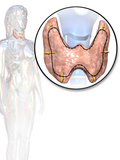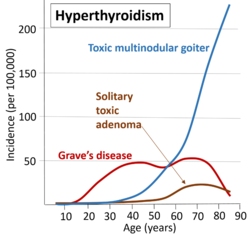Hyperthyroidism
Hyperthyroidism is a medical condition. It is caused by a thyroid gland that is too active.
| Hyperthyroidism | |
|---|---|
| Other names | Overactive thyroid, hyperthyreosis |
 | |
| Triiodothyronine (T3, pictured) and thyroxine (T4) are both forms of thyroid hormone. | |
| Symptoms | Irritability, muscle weakness, sleeping problems, fast heartbeat, heat intolerance, diarrhea, enlargement of the thyroid, weight loss[1] |
| Complications | Thyroid storm[2] |
| Usual onset | 20–50 years old[2] |
| Causes | Graves' disease, multinodular goiter, toxic adenoma, inflammation of the thyroid, eating too much iodine, too much synthetic thyroid hormone[1][2] |
| Diagnostic method | Based on symptoms and confirmed by blood tests[1] |
| Treatment | Radioiodine therapy, medications, thyroid surgery[1] |
| Medication | Beta blockers, methimazole[1] |
| Frequency | 1.2% (US)[3] |
| Deaths | Rare directly, unless thyroid storm occurs; associated with increased mortality if untreated (1.23 HR)[4] |
The thyroid gland makes hormones. These hormones manage the body’s metabolism. An example of one of these hormones is thyroxine.
Synthesis

The thyroid-stimulating hormone starts the making of thyroxine. The thyroid-stimulating hormone is also called “TSH.”
TSH is made in the pituitary gland. Hyperthyroidism is determined by a doctor by blood tests that show a decreased thyroid-stimulating hormone (TSH) level.[5]
Cause
The most common cause of this disorder is "Graves’ disease.” Graves’ disease is a condition in which the thyroid gland becomes overactive. Antibodies from the immune system in the bloodstream attack itself (this is called an autoimmune disease). This causes the thyroid gland to grow, as well as produce more thyroid hormones.[6]
Symptoms
Some symptoms of this disorder are the swelling of the neck, as well as weight loss. In addition, patients could experience their hands trembling, as well as their blood pressure increasing. They could also experience nervousness and anxiety attacks.[7] Medication can stop the effects of hyperthyroidism. However, hyperthyroidism cannot be fixed completely. Hyperthyroidism can occasionally cause death.[8]
Hyperthyroidism Media
Exophthalmos seen in Graves’ ophthalmopathy
References
- ↑ 1.0 1.1 1.2 1.3 1.4 Cite error: Invalid
<ref>tag; no text was provided for refs namedNIH2012. - ↑ 2.0 2.1 2.2 Cite error: Invalid
<ref>tag; no text was provided for refs namedClin2014. - ↑ Cite error: Invalid
<ref>tag; no text was provided for refs namedATA2011. - ↑ Lillevang-Johansen, Mads; Abrahamsen, Bo; Jørgensen, Henrik Løvendahl; Brix, Thomas Heiberg; Hegedüs, Laszlo (2017-03-28). "Excess Mortality in Treated and Untreated Hyperthyroidism Is Related to Cumulative Periods of Low Serum TSH". The Journal of Clinical Endocrinology & Metabolism. The Endocrine Society. 102 (7): 2301–2309. doi:10.1210/jc.2017-00166. ISSN 0021-972X. PMID 28368540. S2CID 3806882.
- ↑ "Thyroid disorders." World of Health. Gale, 2007. Student Resources in Context. Web. 22 Feb. 2016.
- ↑ Mazzone, Theodore. "Graves' disease." World Book Advanced. World Book, 2016. Web. 22 Feb. 2016.
- ↑ Gale Encyclopedia of Alternative and Complementary Medicine, 4th Edition, Farmington Hills, MI: Gale, 2014, pp. 1227-1230.
- ↑ GALE, Cengage Learning, “Thyroid Disorders; Key Q&A” Health and Wellness Resource Center, March 2007. Health and Wellness Resource Center. Retrieved 22 February 2016.





